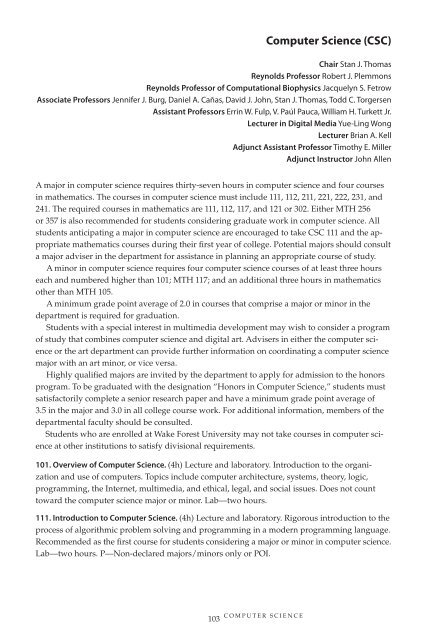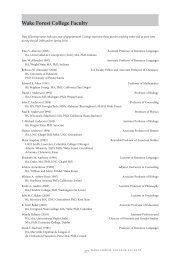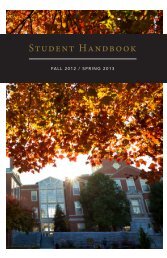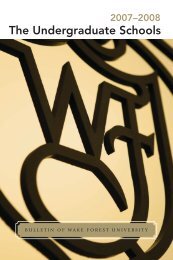theundergraduateschoo ls - Wake Forest University
theundergraduateschoo ls - Wake Forest University
theundergraduateschoo ls - Wake Forest University
Create successful ePaper yourself
Turn your PDF publications into a flip-book with our unique Google optimized e-Paper software.
C O M P U T E R S C I E N C E<br />
103<br />
Computer Science (CSC)<br />
Chair Stan J. Thomas<br />
Reynolds Professor Robert J. Plemmons<br />
Reynolds Professor of Computational Biophysics Jacquelyn S. Fetrow<br />
Associate Professors Jennifer J. Burg, Daniel A. Cañas, David J. John, Stan J. Thomas, Todd C. Torgersen<br />
Assistant Professors Errin W. Fulp, V. Paúl Pauca, William H. Turkett Jr.<br />
Lecturer in Digital Media Yue-Ling Wong<br />
Lecturer Brian A. Kell<br />
Adjunct Assistant Professor Timothy E. Miller<br />
Adjunct Instructor John Allen<br />
A major in computer science requires thirty-seven hours in computer science and four courses<br />
in mathematics. The courses in computer science must include 111, 112, 211, 221, 222, 231, and<br />
241. The required courses in mathematics are 111, 112, 117, and 121 or 302. Either MTH 256<br />
or 357 is a<strong>ls</strong>o recommended for students considering graduate work in computer science. All<br />
students anticipating a major in computer science are encouraged to take CSC 111 and the appropriate<br />
mathematics courses during their first year of college. Potential majors should consult<br />
a major adviser in the department for assistance in planning an appropriate course of study.<br />
A minor in computer science requires four computer science courses of at least three hours<br />
each and numbered higher than 101; MTH 117; and an additional three hours in mathematics<br />
other than MTH 105.<br />
A minimum grade point average of 2.0 in courses that comprise a major or minor in the<br />
department is required for graduation.<br />
Students with a special interest in multimedia development may wish to consider a program<br />
of study that combines computer science and digital art. Advisers in either the computer science<br />
or the art department can provide further information on coordinating a computer science<br />
major with an art minor, or vice versa.<br />
Highly qualified majors are invited by the department to apply for admission to the honors<br />
program. To be graduated with the designation “Honors in Computer Science,” students must<br />
satisfactorily complete a senior research paper and have a minimum grade point average of<br />
3.5 in the major and 3.0 in all college course work. For additional information, members of the<br />
departmental faculty should be consulted.<br />
Students who are enrolled at <strong>Wake</strong> <strong>Forest</strong> <strong>University</strong> may not take courses in computer science<br />
at other institutions to satisfy divisional requirements.<br />
101. Overview of Computer Science. (4h) Lecture and laboratory. Introduction to the organization<br />
and use of computers. Topics include computer architecture, systems, theory, logic,<br />
programming, the Internet, multimedia, and ethical, legal, and social issues. Does not count<br />
toward the computer science major or minor. Lab—two hours.<br />
111. Introduction to Computer Science. (4h) Lecture and laboratory. Rigorous introduction to the<br />
process of algorithmic problem solving and programming in a modern programming language.<br />
Recommended as the first course for students considering a major or minor in computer science.<br />
Lab—two hours. P—Non-declared majors/minors only or POI.






